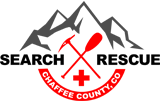Hiker calls 911 due to shakes and vomiting after getting stuck on 14er overnight
- Spencer McKee, The Denver Gazette; Oct. 9, 2023
On September 13, a 73-year-old male set out to summit the 14,075-foot Mount Columbia near Buena Vista. He was successful in reaching the top of the peak, but quickly ran into trouble on his descent.
As rain, snow, and fog rolled in, the man found it difficult to keep proceeding down the mountain, opting to stop and spend a night above treeline at close to 14,000 feet of elevation. The man made this decision despite not being prepared for a night in this type of terrain, with only a windbreaker, sweatshirt, jacket, and headlamp.
The next morning, the man resumed his trek down the mountain before dawn, though he opted to call 911 for assistance due to experiencing extreme cold, shaking, and vomiting. His call placed him at about 13,700 feet of elevation on the eastern side of the peak.
The man was advised to stop heading downhill and to wait for search and rescue given the extreme terrain he would have entered if he continued on his trajectory. By about 8:00 a.m., the hiker was spotted via helicopter and determined to be medically stable, soon flown to Denver’s Swedish Hospital for further evaluation.
This incident highlights several important pieces of knowledge that all hikers in Colorado’s backcountry should be aware of.
First – bringing layers and gear for an unplanned night on the mountain can be crucial for survival.
Second – Spending a night in high-elevation terrain can result in altitude sickness, which can have serious impacts in regard to mobility and logic – also often resulting in vomiting and nausea and on rare occasion, death. Being aware of how elevation can impact the ability to make sound decisions can be part of counteracting this symptom. Have an established plan prior to entering high elevation terrain that was crafted prior to the symptoms of altitude sickness setting in. This can help make it easier to make a smart decision in the midst of brain fog.
Third – Weather changes fast and it’s important to have a plan for what to do when it happens. This includes being highly aware of the forecast prior to leaving the trailhead, also having the right gear to face off with the elements should unexpected weather arise.
Fourth – Never hesitate to call emergency services for rescue when help is needed. Given this man’s lack of preparation for a night on the mountain, calling on day one would have been the best decision. Even if search and rescue decides that no help is needed or that a morning operation is best, they’re aware of the situation that’s unfolding and able to provide sound advice.
Thanks goes out to Chaffee County Search and Rescue North and Flight for Life Denver for their role in this successful mission.
If you’re interested in supporting Colorado’s volunteer-powered search and rescue operation, one way to do so is through the purchase of a CORSAR card. It’s cheap, at only $3 per year.

